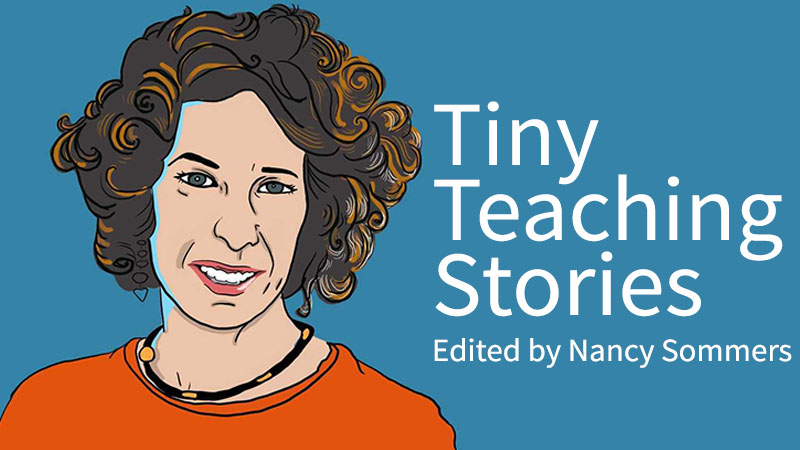-
About
Our Story
back- Our Mission
- Our Leadershio
- Accessibility
- Careers
- Diversity, Equity, Inclusion
- Learning Science
- Sustainability
Our Solutions
back
-
Community
Community
back- Newsroom
- Webinars on Demand
- Digital Community
- The Institute at Macmillan Learning
- English Community
- Psychology Community
- History Community
- Communication Community
- College Success Community
- Economics Community
- Institutional Solutions Community
- Nutrition Community
- Lab Solutions Community
- STEM Community
- Newsroom
- Macmillan Community
- :
- English Community
- :
- Bits Blog
Bits Blog
Options
- Mark all as New
- Mark all as Read
- Float this item to the top
- Subscribe
- Bookmark
- Subscribe to RSS Feed
Bits Blog
Showing articles with label Developmental English.
Show all articles
Expert
11-01-2024
01:52 PM
by Christina Davidson, University of Louisville This post is part of an occasional series affiliated with the Writing Innovation Symposium (WIS), a regional event with national reach that takes place annually online and in Milwaukee, WI. In 2024, Christina was a Bedford/St. Martin’s WIS Fellow. Learn more below and in posts tagged “writing innovation” and “WIS.” Large Language Models (such as ChatGPT) became widely available in November of 2022. Since that time, students have been exploring their use and are eager to learn more. As a veteran composition teacher and member of a WPA team, I was hopeful to find a way to address student GenAI curiosity in my own classroom. AI and Writing (2023), Sidney I. Dobrin’s classroom-friendly text, was exactly what I needed . In the second half, which focuses on “opportunities and applications,” Dobrin borrows a powerful metaphor from GenAI expert Cath Ellis. He compares approaches to writing to ways of summiting Mt. Everest. For Ellis, writing is akin to climbing just as GenAI is to riding a helicopter to the mountain top (60). Each option leads to the summit or goal, yet they provide contrasting experiences—and very different opportunities to learn. Together, Dobrin’s book and Ellis’s metaphor gave me an idea for getting writers to think about GenAI and the writing process. The 75-minute workshop I designed, “Process, Post-Process, and GenAI,” starts with a focus on writing. In fact, I don’t even mention GenAI until the closing discussion. Instead, I start by asking participants to use materials I provided (i.e., blank paper, markers, colored pencils) to draw any task they perform in which several paths could lead to the same result. Here are a few memorable examples from my first workshop which occurred at the 2024 Writing Innovation Symposium, held at Marquette University. Thoughtful participants drew multiple ways to learn a new language, different methods for preparing rice, and various paths to explore inside an open-world game, just to name a few. Wesley Fryer - EdTechSR Ep 308 Exploring AI in Education After drawing, participants share in small groups to kick off the discussion. This is a great time to “work the room” and see which drawings might be best shared with the entire group. The resulting conversation opens a dialogue in which participants analyze their own writing process and how it might compare to one of the “paths” in the drawing. The conversation is not meant to imply a favoritism for a certain method or path (helicopters are certainly useful machines, as is Duolingo), but to increase the critical way students consider the writing process. It’s the first step toward engaging with the most essential question at the close of the workshop–What might happen if change my writing process to include GenAI? On my campus, most FYC students are familiar with process-oriented pedagogy from prewriting and drafting, to revising, editing, and finally “publishing” or submitting their work. Our students might imagine each of the steps the hiker must complete before the summit is reached, just as they might imagine the work that is placed into completing a final draft. However, we know the hike to the top of a mountain is rarely, if ever, a straight line–and our writing processes aren’t straightforward either. Just as the hiker may need to navigate a blocked trail, so, too, the writer must negotiate struggles in completing a draft. As we close our discussion, I return to one of my favorite examples. At my first workshop, one participant drew the creative choices players make in open world games. He charted several “mini-bosses” and side quests, which we might imagine as rounds of peer revisions, writing center visits, or conducting additional research while writing a large paper. If a GenAI tool could take the gamer straight to the credits, clearly much would be forfeited. Similarly, there’s much to be lost when a writer uses ChatGPT to create a “final” draft. The example also illustrates how a post-process approach to writing is highly contextual and social, two areas where GenAI just isn’t as helpful. The workshop ends with reflective writing concerning our shared discoveries through discussion. I have been encouraged to hear how quickly FYC students identify the critical human element they wish to retain in writing. Most participants agree that LLMs can be useful for some writing tasks, but preserving agency over their personal writing often remains at the center of student concern. Are you interested in fostering conversations about process and GenAI tools in the classroom? I would encourage you to try my exercise in your own classroom and to let students discover for themselves how the most memorable processes are ones that meander and land in unexpected places. I often recall an exasperated FYC student that lamented, “It took forever to write this paper!” I quickly responded, “Lucky you!” because I knew this student had gained so much learning in that work. To follow C.P. Cavafy’s poem “Ithaka,” I reminded her of the opening line—“As you set out for Ithaka, hope your journey is a long one.” A writing process full of discovery, invention, and reinvention is one I encourage in my FYC course—and although GenAI can be helpful on a step of that iterative journey toward destinations unknown, the understanding of what “these Ithakas” mean is only known to the writer who writes them. The theme for WIS ‘25 is mise en place, a culinary term for putting things in place before cooking, especially in a professional kitchen. For us, it’s a metaphor for getting ready to write as well as a pathway to exploring the interrelationship between writing and food. Join us online or in Milwaukee, WI, January 30-31, 2025. Proposals are welcome through 10/25 and, for undergraduate writers, through 12/13. Registration opens in early November.
... View more
Labels
-
Composition
-
Developmental English
-
Events and Conferences
0
1
1,602
Author
04-07-2023
07:00 AM
Today's Tiny Teaching Story is by Jordan Hill, composition instructor in the Global First Year program at Florida International University. A recently-selected Fulbright Scholar, he will soon move to Italy to research a short story collection.
Idioms
I tell my class of international students that a certain American literary character is “an odd duck.” They stare at me with tilted heads and confused smiles. I imagine what they must be imagining—Jay Gatsby as a strange waterfowl. I clear my throat. “Sorry, everyone,” I say. “An ‘odd duck’ is an idiom. An expression.” How can I explain this? “An odd duck is sort of like a black sheep.” Again, the quizzical faces. Too late, I register my second, unintentional idiom. I sigh and explain what happened. They laugh, and I try again.
Submit your own Tiny Teaching Story to tinyteachingstories@macmillan.com! See the Tiny Teaching Stories Launch for submission details and guidelines.
... View more
Labels
-
Composition
-
Corequisite Composition
-
Developmental English
-
Literature
1
1
1,870
Author
03-17-2023
07:00 AM
Today's Tiny Teaching Story is by Xinqiang Li, a writing instructor at Michigan State University.
Class as People
It’s the students who have inspired me to bring out the best in my teaching. Their eager questions, timely submissions, and even the smiley faces at the end of their emails remove my nervousness and tiredness at the beginning of the semester.
They remind me to teach the class as people.
Gradually, I’ve learned to imagine the class as a tea house conversation. I step off the platform, walk among the students, and change the sentence “Writing is an epistemic and recursive process” into “How many drafts do you usually write?”
Then, I see eyes light up in the class.
Submit your own Tiny Teaching Story to tinyteachingstories@macmillan.com! See the Tiny Teaching Stories Launch for submission details and guidelines.
... View more
Labels
-
Composition
-
Corequisite Composition
-
Developmental English
-
Literature
2
1
1,555
Author
02-24-2023
07:00 AM
Today's Tiny Teaching Story is by Christine Cucciarre, Professor of English and Director of Composition at the University of Delaware.
Weight
I read the want ads during the pandemic. At the end of each Zoom class, I clicked “Leave Meeting,” and cried. Maybe I could drive a truck. Sling mulch at Home Depot. Stock shelves at Target. Just to go to work. Leave work. Be home. No torment of failing my students, failing myself.
Fall semester I returned to the classroom. Walk to work. Teach. Return home. Repeat. Still, no lingering with students, office conferences, chatting with colleagues in the copy room.
The sudden weight of the pandemic was so easy to put on, but it’s so hard to take off.
Submit your own Tiny Teaching Story to tinyteachingstories@macmillan.com! See the Tiny Teaching Stories Launch for submission details and guidelines.
... View more
Labels
-
Composition
-
Corequisite Composition
-
Developmental English
-
Literature
1
2
2,050
Author
02-03-2023
07:00 AM
Today's Tiny Teaching Story is by Stuart Barbier, a Professor of English at Delta College. Partly Veiled Validation I returned to mask-to-mask teaching after three semesters asynchronously online. About half of our college's students elected to return, too. Yet, the hallways were oddly quiet, and I only saw a few colleagues. I'd always speak, even if just a quick hello. One colleague barely acknowledged my greeting the first time, and then was silent all the others, not even looking my way when I added his name. Might as well have been online with my camera off. In contrast, my students acknowledged my presence with their eyes, words, and only partly veiled validation. Submit your own Tiny Teaching Story to tinyteachingstories@macmillan.com! See the Tiny Teaching Stories Launch for submission details and guidelines.
... View more
Labels
-
Composition
-
Corequisite Composition
-
Developmental English
-
Literature
0
0
1,151
Author
01-20-2023
07:00 AM
Today's Tiny Teaching Story is by John Hansen. John Hansen received a BA in English from the University of Iowa and an MA in English literature from Oklahoma State University. His work has appeared or is forthcoming in The Summerset Review, One Sentence Poems, The Dillydoun Review, Schuylkill Valley Journal, Eunoia Review, Litro Magazine, Wild Roof Journal, The Banyan Review, Drunk Monkeys, and elsewhere. He has presented on a variety of topics at The National Institute for Staff and Organizational Development (NISOD), The Conference on College Composition and Communication (CCCC—Regional), The American Comparative Literature Association, The Midwest Conference on British Studies, and others. He is an English Department faculty member at Mohave Community College in Arizona. Read more at johnphansen.com. Unknown Impacts: Be Kind Early in the Fall 2020 semester, I sent e-mails to several students who stopped participating in our developmental English course. Ben responded two days later apologizing. Hours later, I answered the phone - it was Ben. Small talk quickly turned to him revealing a recent divorce, eviction, and layoff (due to COVID-19). I chatted with Ben weekly. He became one of the better writers in class. Days before the semester ended, Ben sent an e-mail about how he would have ended his life if he didn't have someone to talk with that day. I've reflected on this and Ben every semester. Submit your own Tiny Teaching Story to tinyteachingstories@macmillan.com! See the Tiny Teaching Stories Launch for submission details and guidelines.
... View more
Labels
-
Composition
-
Corequisite Composition
-
Developmental English
-
Literature
1
1
3,732
Author
01-13-2023
07:00 AM
Today's Tiny Teaching Story is by Eileen Curran-Kondrad, Teaching Lecturer, English, at Plymouth State University. Eileen has written her story as a poem. About the Course No birdies, no eagles no long drives I slink off the course after the ninth On the terrace outside the clubhouse college tournament players mill around. I browse the tables brimming with golf swag. A voice calls out a young man approaches. Remember me? I took your class last year. We read five books that semester. You turned me into a reader. I went on to read David Copperfield. I just had to tell you. I roll my clubs to the car chuckle to myself. Did I just get a hole in one? Submit your own Tiny Teaching Story to tinyteachingstories@macmillan.com! See the Tiny Teaching Stories Launch for submission details and guidelines.
... View more
Labels
-
Composition
-
Corequisite Composition
-
Developmental English
-
Literature
0
0
1,083
Author
01-13-2023
07:00 AM
Today's Tiny Teaching Story is by Kyle McIntosh, an Assistant Professor in the Department of English and Writing at the University of Tampa where he teaches in the Academic Writing and TESOL Certificate programs. Mirror “The professor always provides such useful feedback. I don’t know how he has time to read each paper so carefully,” wrote a student on my course evaluation last fall. “He never gives us any feedback,” wrote another. “He doesn’t care about students at all.” Suddenly, I wondered: “Are there two versions of me – one good teacher and one bad – who appear to different students in the same class at different moments on different days? And which one is the me who is reading these comments now?” Just to be safe, I shave off my goatee. Submit your own Tiny Teaching Story to tinyteachingstories@macmillan.com! See the Tiny Teaching Stories Launch for submission details and guidelines.
... View more
Labels
-
Composition
-
Corequisite Composition
-
Developmental English
-
Literature
0
0
1,134
Author
12-16-2022
07:00 AM
Today's Tiny Teaching Story is by Dr. Chris M. Anson. Chris is a Distinguished University Professor at North Carolina State University, where he is also the Director of the Campus Writing & Speaking Program.
The Big Reveal
On the last day of the semester, the elderly bearded gentleman in my 200-student course on English language and linguistics approached me, smiling. “I have thoroughly enjoyed this class,” he said. “You’re clearly a dedicated and student-centered teacher.” As a newly-minted professor, I took his words as high praise. “You see, I’m retired,” he continued, “but I take one course each semester to keep learning.” “That’s awesome!” I said. “What sort of work did you do?” He smiled. “Until last year, I was the provost here.” Stunned, I realized that his gift was more than his praise; it was waiting until the end to disclose.
Submit your own Tiny Teaching Story to tinyteachingstories@macmillan.com! See the Tiny Teaching Stories Launch for submission details and guidelines.
... View more
Labels
-
Composition
-
Corequisite Composition
-
Developmental English
-
Literature
0
0
1,053
Author
12-02-2022
07:00 AM
Today's Tiny Teaching Story is by Kelle Alden, an Assistant Professor of English and Director of the Writing Center at the University of Tennessee at Martin. Every Year, I Flunk a Decent Person During our conference, I showed my student the math. Regardless of his excellent attendance and participation, without his missing homework and essays, he would fail English. My student looked sheepish, gave excuses, promised to catch up. I no longer take it personally when students lie to me. I try to teach in the moment, to appreciate how my student smiles and greets me every day. Seeing the whole of him will help after finals, when I have to deliver my most difficult lesson. I will still smile for him next semester, even if he cannot return the gesture right away. Submit your own Tiny Teaching Story to tinyteachingstories@macmillan.com! See the Tiny Teaching Stories Launch for submission details and guidelines.
... View more
Labels
-
Composition
-
Corequisite Composition
-
Developmental English
-
Literature
0
0
1,118
Author
11-11-2022
07:00 AM
Today's Tiny Teaching Story is by Dr. Leslie Werden, a Professor of English & Rhetoric and Department Head of Humanities at Morningside University in Sioux City, Iowa. She teaches Persuasive Writing, Small Group Communication, Literary Theory & Analysis, British Literature, Page to Stage, and more. Blaming Binaries The large post-it note, halved with a line down the middle separating a list of binaries, was left behind in the classroom. On one side: white, power, strength, leader, good. On the other: black, no control, weakness, follower, bad. The lone black student arrived in the classroom and cocked her head, glaring at the list, brows furrowed, lips tightly pressed together. “What. Is. This?” she asked her professor. A discussion about three different stories from the class before. “Thank God,” the student said. The binaries left behind, assume too much and remain misunderstood. Submit your own Tiny Teaching Story to tinyteachingstories@macmillan.com! See the Tiny Teaching Stories Launch for submission details and guidelines.
... View more
Labels
-
Composition
-
Corequisite Composition
-
Developmental English
-
Literature
0
0
1,264
Author
10-21-2022
07:00 AM
Today's Tiny Teaching Story is by Lauri Mattenson. Lauri is a Lecturer with UCLA Writing programs. Holding Zoom Space She’s sitting in her empty bathtub, laptop propped up on a stack of towels, because there’s no room anywhere else in the apartment. He’s in his garage using his neighbor’s wifi. She’s on academic probation and never submitted a draft. They are using a laptop with seven missing keys and a cracked screen. He hasn’t had a good night’s sleep in two weeks. She’s taking care of three little sisters during class. He’s the only Covid-negative person in a household of six. They are working 25 hours a week while going to school full-time. We’re weary, but we’re all here. Submit your own Tiny Teaching Story to tinyteachingstories@macmillan.com! See the Tiny Teaching Stories Launch for submission details and guidelines.
... View more
Labels
-
Composition
-
Corequisite Composition
-
Developmental English
-
Literature
0
0
1,091
Author
09-30-2022
07:00 AM
Today's Tiny Teaching Story is by Jennifer Smith Daniel, Director of Writing Center and Writing Across the Curriculum Programs at Queens University of Charlotte. Restoring Your Tongue... Earlier in the Center, you’d encouraged a first-year with her assignment. Then sat in the comfy red chair of my office as essential oils penetrated our masks to cry out your anger at the professor who commented on your writing with his elitist, prescriptive perspective. He never learned the story of how your family stopped speaking Spanish at home because you didn’t get registered for preschool after migrating from Mexico. Later, I stood in the front our class as another white women teacher and offered you Anzaldúa. You found restoration in the new word - Chicana. Submit your own Tiny Teaching Story to tinyteachingstories@macmillan.com! See the Tiny Teaching Stories Launch for submission details and guidelines.
... View more
Labels
-
Composition
-
Corequisite Composition
-
Developmental English
-
Literature
1
0
1,131
Author
09-09-2022
07:00 AM
Today's Tiny Teaching Story is by Pamela Childers, a lifelong secondary, undergraduate and graduate school educator, writer, editor, and consultant. She enjoys collaborating with colleagues and students. My First Teacher Letitia, my Welsh Grammie, took me at three to the circus in Philadelphia, while Mother worked at a switchboard and Dad was still overseas after the war. She read me poetry and prose long after I had started teaching English and recited Shakespeare for the Princeton Women’s Club in her late seventies, an age I am close to reaching. When I last visited her in the dementia ward of the nursing home, she looked up at me from her wrinkled pillow, smiled and said, “I raised you, didn’t I?” I nodded, and we both shared an unforgotten memory. Submit your own Tiny Teaching Story to tinyteachingstories@macmillan.com! See the Tiny Teaching Stories Launch for submission details and guidelines.
... View more
Labels
-
Composition
-
Corequisite Composition
-
Developmental English
-
Literature
1
1
1,428
Author
08-19-2022
07:00 AM
Today's Tiny Teaching Story is by Rhona Blaker. Blaker is an adjunct instructor of English at Glendale Community College, where she also serves as the Campus Coordinator for Contexualized Teaching and Learning. From the Pantry Most mornings I stare at my own face next to twenty-five black squares. One Thursday, desperate for human contact, I begged the students to reveal their faces. Three students complied. Later, a young woman e-mailed to say she never turns her camera on because she takes class on a tablet while sitting in a pantry, trying to escape the ten other people who live in her apartment. I apologized for imagining English 101 was ever about me and rejoiced when she later wrote to say she had been accepted to UCLA after earning a 4.0 GPA in her community college closet. Submit your own Tiny Teaching Story to tinyteachingstories@macmillan.com! See the Tiny Teaching Stories Launch for submission details and guidelines.
... View more
Labels
-
Composition
-
Corequisite Composition
-
Developmental English
-
Literature
1
3
1,786
Topics
-
Bedford New Scholars
42 -
Composition
238 -
Corequisite Composition
33 -
Developmental English
31 -
Events and Conferences
18 -
Instructor Resources
6 -
Literature
40 -
Professional Resources
7 -
Virtual Learning Resources
4
Popular Posts








